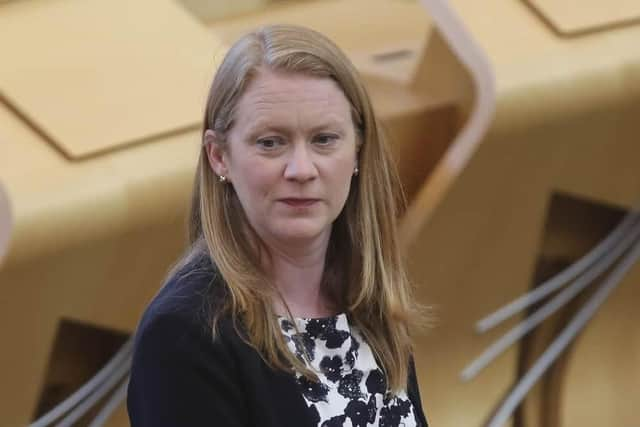UK Government to seek legal costs after Scottish ministers abandon gender court battle
UK ministers are to pursue legal costs after the Scottish Government confirmed it will not appeal a court ruling that upheld a Westminster veto of its controversial gender reforms.
Scottish Secretary Alister Jack said an application will be lodged with the court “seeking our expenses in defending this matter”. It comes after Shirley-Anne Somerville, the SNP social justice secretary, said it was “impossible” to see a way forward.
Advertisement
Hide AdAdvertisement
Hide AdHowever, she insisted the Gender Recognition Reform (Scotland) Bill was not “in the bin” and expressed hope that a future UK Labour government may back it.


The legislation was passed by a cross-party majority of MSPs at the end of last year before being blocked by the UK Government – a decision that was deemed lawful by the Court of Session.
Mr Jack said: “I welcome the Scottish Government’s acceptance of the court’s judgment, which upheld my decision to prevent their gender recognition legislation from becoming law.
“The Scottish Government chose to pursue this litigation in spite of the cost to the taxpayer. These resources would have been better spent addressing the priorities of people in Scotland – such as growing the economy, cutting NHS waiting lists and improving our children’s education.
“The UK Government now intends to lodge an application with the court seeking our expenses in defending this matter.”
The Bill would have allowed trans people to obtain a gender recognition certificate (GRC) without the need for a medical diagnosis. It would also have enabled 16 and 17-year-olds to apply for a GRC for the first time, and would have reduced the amount of time a person has to live in their acquired gender before they could be granted the document.
However, Mr Jack argued it impacted on UK-wide equality law and raised concerns about single-sex spaces and equal pay protections.
In two days of hearings in September, the Scottish Government argued Mr Jack’s decision to block the legislation using section 35 of the Scotland Act was unlawful, insisting he had made errors in law and the grounds on which the order had been made were irrational. But Lady Haldane rejected its legal challenge.
Advertisement
Hide AdAdvertisement
Hide AdHer ruling was a major blow to First Minister Humza Yousaf, who previously insisted fighting Mr Jack’s “undemocratic veto” was a matter of principle. His predecessor, Nicola Sturgeon, had accused the UK Government of a “full-frontal attack” on the Scottish Parliament.
Ms Somerville said the Bill would not be withdrawn by the Scottish Government. “If the current UK Government is willing to work together on this, we will happily sit down with them,” she told MSPs. “If a future UK Government are willing, we will do so with them, so that the section 35 could be lifted and the Bill progress. It seems clear that the current government will not do this and it remains to be seen what a future government will do.”
She said the UK Government viewed the section 35 powers as a “veto” that can be used on legislation they “disagree with”, adding: “Regardless of people’s views and opinions on gender recognition, that is a very worrying place for our Parliament to be.”
Ms Somerville said the Scottish Government “will never waver” in its commitment to the rights of transgender people.
She said: “I recognise that many trans people will be disappointed by this decision. To them, I say this – the Scottish Government will never waver in our commitment to your rights.
“You deserve to be respected, included and supported. You are not a threat and you will always be able to live your lives free from prejudice and abuse in the type of Scotland we want to see.
“We will continue to work towards a society that is equal and fair and where people can live as they are, just as we will continue to protect the democratic pillars of this, Scotland’s Parliament.”
Prior to the ministerial statement, Ms Somerville was forced to apologise to the Scottish Parliament after the decision was leaked to the press on Tuesday.
Advertisement
Hide AdAdvertisement
Hide AdSNP MP Joanna Cherry, a long-term critic of the legislation, called on MSPs to apologise to “life-long feminists” who had campaigned against the Bill amid concerns it would impact on the safety of women and girls.
Posting on X, Ms Cherry said: “All that remains now is for a long overdue apology from MSPs from all parties who rubbished the legitimate concerns of life-long feminists and LGB activists.”
Scottish Conservative deputy leader Meghan Gallacher said: “It’s beyond frustrating that the SNP are still intent on pursuing their deeply flawed gender self-ID policy – despite the Scottish public being opposed and ministers suffering a humiliating court defeat on it.
“Shirley-Anne Somerville may have accepted that she’d be on a legal hiding to nothing appealing the Court of Session verdict, but she also insisted the Nationalist coalition will not be withdrawing the Gender Recognition Reform Bill, which means it could return to Parliament in a different form.
“That will dismay women’s groups and proves that ministers have still not learned the lessons of having squandered time and taxpayers’ money on a doomed legal case. Their self-ID policy undermines the rights and safety of women, girls and vulnerable young people.
“Women’s groups were ignored throughout this debate – and they are still being ignored now. The SNP are more concerned about maintaining their toxic partnership with the extremist Greens than admitting they got this Bill badly wrong and going back to the drawing board.”
Scottish Labour’s Paul O’Kane, the party’s social justice spokesman, said: “The Cabinet secretary has essentially said that the Bill will remain in limbo after the smoke from the court wrangling between the two governments clears.”
Comments
Want to join the conversation? Please or to comment on this article.
